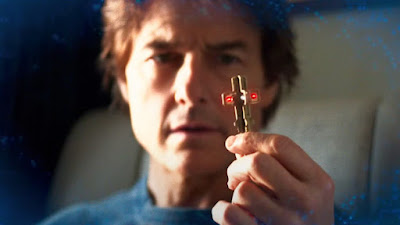Friday, June 27, 2025
Mission: Impossible—The Final Reckoning
Wednesday, July 12, 2023
Mission: Impossible—Dead Reckoning, Part 1
There are other odd little issues, like that director McQuarrie (who has done some inspired work in previous film in the series) seems to have shot some dialog scenes using three cameras, that are edited in such a way that, when edited together, seems to have the actors not addressing each other in conversation. It's odd...and a little off-putting. Given the attention to detail in the action sequences, why would something like that occur?
Saturday, October 22, 2022
Interview With the Vampire: The Vampire Chronicles
Friday, June 3, 2022
Top Gun: Maverick
Controversial yet factual opinion: Anthony Edwards is hotter than Tom Cruise in Top Gun. First of all, the mustache? WORKS. Second of all, he's fun! Third of all, Maverick is such a desperate, narcissistic, posturing, alienating, twerpy little prince that I find myself disorientingly at odds with a former self who long ago considered Tom Cruise to be attractive. Who was she? That woman who could look at a picture of young Tom and not flash immediately to this jittery rat terrier with a barely contained rage problem, a monomaniacal fixation on personal glory at the expense of the safety of everyone around him, and an approach to women that can charitably be described as Biff-esque? I don't know her.* Fourth of all, Maverick's hair is bad! It needs to be EITHER SHORTER OR LONGER.
Tuesday, September 21, 2021
Lions for Lambs
"Never engage the enemy for too long, or he will adapt to your tactics"
The trouble here is that the issues are so immediate that the arguments the film is making were too late four years ago. So, it's a bit like soft-ball preaching to the choir. The arguments are sound, but they have very little relevance to extricating us from the tar-pit of this conflict, and, yes, people are getting chewed up by it, but that's the business of war, and why you try to avoid it, rather than rush in like a damned fool. It's great to be able to say all this with 20-20 hind-smugness, but it's essentially useless. Now tell us something we don't know, and how we can avoid it the next time. "Is he failing you?" a fellow frat asks the student about his meeting. The movie certainly is.
* The title derives from a phrase from World War I, but, the exact nature of the quote is subject to debate, and its history, like the film, is a bit muddled.
Saturday, July 17, 2021
Tropic Thunder
And, traditionally, Saturday is "Take Out the Trash" Day...
"Nobody Goes Full-Retard"
There's a good idea in Ben Stiller's Tropic Thunder, a comic story about a trio of self-indulgent actors making a Viet-Nam era war film. By a Machiavellian director's conceit, they end up abandoned in a jungle pursued by drug traffickers, with nothing but their persona's to protect them.* The film tosses in more inside-Hollywood jokes than a Scary Movie installment, and some of them turn out to be actually funny.
The trouble is the film itself is top-lined by self-indulgent actors all vying for screen-time to see how broadly they can play their parts. It's meant to be satire, and it's plenty satirical, as long as Stiller, Robert Downey, Jack Black and Tom Cruise are making fun of the Hollywood excesses of...other actors.** But one is reminded of a less-disciplined, unfunny version of It's a Mad, Mad, Mad, Mad World in the broadness of the playing, and heavy-handedness with which its presented. Imagine Dr. Strangelove if every performance had the wing-nut intensity of George C. Scott's.
Tropic Thunder brays and screeches constantly, it's soundtrack thudding with an annoying loudness for scenes even taking place in the quiet of night. There might have been some worry on the studio's part about letting the movie breathe, or fear that the pace might slacken. All well and semi-good. But it gives the film the light and airy feeling of a train barreling into a brick wall. And the frenetic style and the frequent unintelligibility of the actors makes it a frustrating movie-going experience. Still, there are moments: the movie starts with a commercial and previews for films featuring the characters in the film, and they are inspired little mini-movies that skewer trailer-style marketing, as well as Hollywood hype. None too subtle, but they're mercifully short and focused. Then there's the performance of Matthew McConaughey, as the distracted agent of Stiller's Tugg Speedman, a breezy graceful performance that's funny and relaxed, but just as nuanced as the other, more aggressive performances."I don't know" is the reply.
I found myself laughing at the vacuousness of the exchange, but now, in retrospect, I regret it. Maybe I was desperate for a laugh at that point.
** It's pretty obvious who is being made fun of here: Stiller makes a wicked stab at Cruise mannerisms, Downey is tweaking Russell Crowe and heavy-method actors--his Aussie Kirk Lazarus undergoes treatments to turn his skin black and never breaks character from a dialect straight out of Amos n' Andy, and Jack Black is one of the long line of overweight, drug-addicted comedians on a short fuse. And though Cruise has cause to lampoon Summer Redstone, his movie mogul is more in the Weinstein mode (and is supposedly based on Stiller's production partner Stuart Cornfeld).



















































